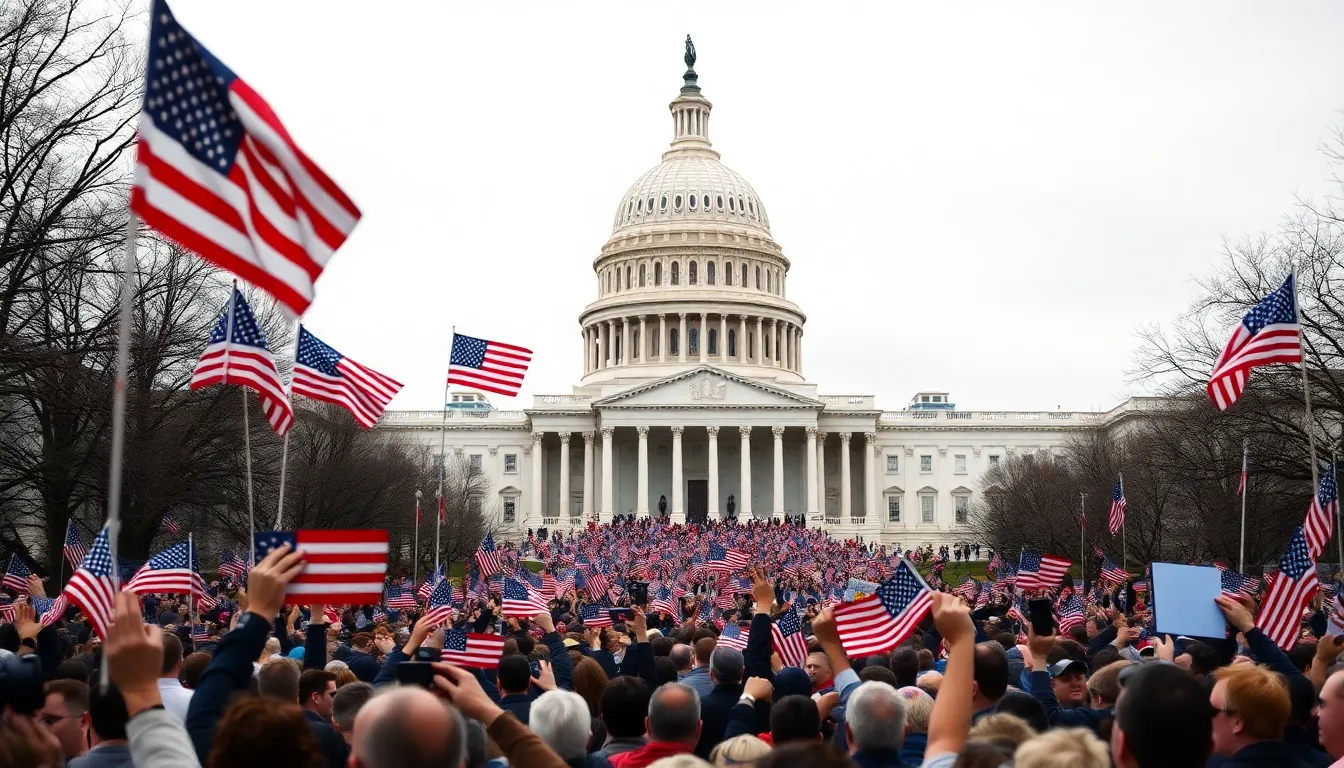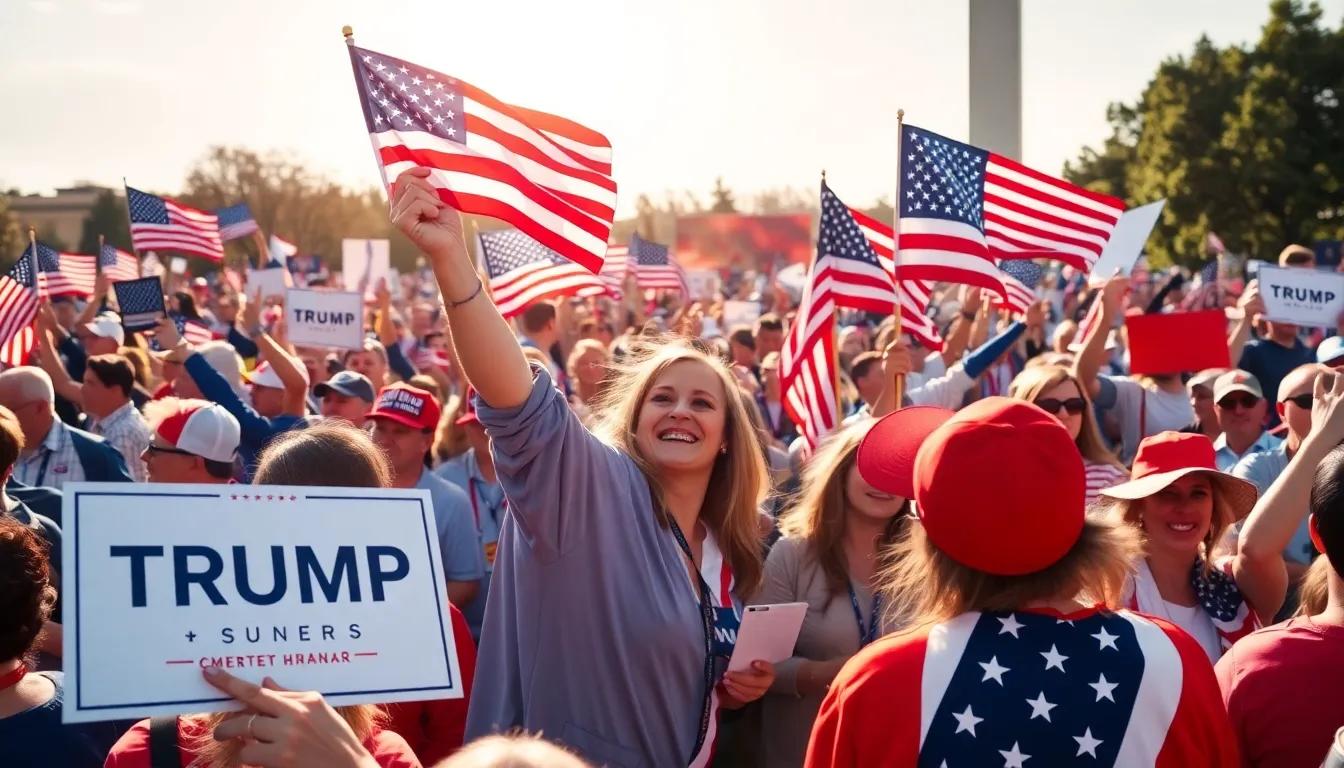As the political landscape shifts and the buzz of the next election grows louder, many are left wondering: when’s the next Trump inauguration date? Whether you’re a die-hard supporter or just a curious observer, this date could be the next big event to mark on your calendar.
Table of Contents
ToggleOverview of Inauguration Dates
Inauguration dates for U.S. presidents follow a consistent pattern. Traditionally, these ceremonies occur on January 20 following the election. This date signifies the start of a new presidential term. For example, President Trump’s inauguration took place on January 20, 2017.
Historical shifts occurred in 1937, marking the first inauguration held on January 20. Prior inaugurations were customarily held on March 4. Shifts aimed to shorten the lame-duck period between elections and taking office. It’s essential to recognize that these dates also reflect broader political contexts.
January 20 serves as a pivotal moment for both supporters and opponents. Dates can shift if they fall on a Sunday. In such cases, the public ceremony gets postponed until Monday.
Upcoming elections may shape future inauguration dates. For the next presidential election scheduled for November 5, 2024, the subsequent inauguration would then occur on January 20, 2025. Observers prioritize this date due to the potential impacts on national policy and direction.
Notably, special events and ceremonies accompany inaugurations. These often include parades, festivities, and speeches designed to unify the nation. Different states may also host local observances, adding regional significance.
Tracking these important dates helps individuals understand their implications. A clear awareness of when they occur enhances civic engagement. Anticipating the next inauguration date informs ongoing discussions about political trends and developments.
Historical Context of Inaugurations

Inauguration Day carries profound historical importance within the American political landscape. This day signifies the commencement of a new presidential term, instilling hope and anticipation among citizens.
Significance of Inauguration Day
Inauguration Day serves as a vital marker for political transitions, highlighting the change in leadership. This significant day represents more than just a ceremony; it embodies the democratic process. Citizens engage in various events that celebrate new beginnings and reflect collective unity. Each inauguration, whether celebratory or contentious, shapes national identity. January 20, designated for inaugurations since 1937, replaces March 4 to decrease the lame-duck period. Understanding this day fosters awareness of its impact on governance and policy direction.
Comparison with Previous Presidents
Comparing various presidential inaugurations reveals distinct themes and moments. From Franklin D. Roosevelt’s four-term legacy to the symbolic nature of John F. Kennedy’s address, each event carries unique significance. Presidents often reflect the political climate of their time, influencing public perception and response. Inaugurations from contentious elections, such as that of Abraham Lincoln, illustrate how transitions can signify hope or division. Historic elements, like reciting the oath of office and inaugural addresses, remain consistent, yet evolving context frames each event differently. This continuous evolution showcases the dynamic nature of American democracy and its leaders.
When Is Trump Inauguration Date?
The next Trump inauguration date is set for January 20, 2025. This date follows the traditional schedule for U.S. presidential inaugurations. Since the establishment of January 20 as the official inauguration date in 1937, it has been significant for both supporters and opponents of incoming presidents.
Important political discussions will occur around that date. January 20, 2025, serves as a marker for potential shifts in national policy and direction following the election. The next presidential election, occurring on November 5, 2024, leads to heightened anticipation regarding the inauguration.
Inauguration Day holds deep historical context in American politics. It symbolizes hope, political transition, and unity for many citizens. Inaugurations illustrate the democratic process through celebratory events, reflecting the political climate of their times. Each inauguration features elements like the oath of office and inaugural addresses, which enhance the ceremonial nature of the day.
Unique themes and moments from past inaugurations indicate the evolving nature of American leadership. Recent elections often highlight the division or unity present in the country. Thus, January 20 remains pivotal, offering insight into the political landscape and the future trajectory of the nation.
Future Political Implications
The upcoming inauguration on January 20, 2025, carries significant political implications for the nation. This date marks not only the start of a new presidential term but also a critical juncture leading up to the November 5, 2024, presidential election. Observers note that the atmosphere surrounding Trump’s potential second term could impact voter sentiment and engagement across the country.
Supporters might view the inauguration as a renewance of their values and priorities, while opponents may express heightened scrutiny over proposed policies. Key issues could emerge from this transitional period, influencing legislative agendas and national discourse. Potential shifts in foreign policy are likely, along with expected changes in economic strategies, depending on the outcome of the election.
Debates surrounding social policy could intensify as various interest groups mobilize in response to anticipated changes in leadership. It becomes clear the inauguration in 2025 serves as a reflection of the electoral climate, showcasing how public opinion may drive policy decisions in the following years.
Trends in historical context indicate that inaugurations often shape the future political landscape, underscoring the importance of unity or division among the electorate. Notably, January 20 serves as a pivotal moment not just for those in power but also for citizens participating in the democratic process. The significance of this day can resonate deeply, affecting grassroots movements and advocacy efforts as the country navigates its political future.
Political observers understand that the transition of power embodies a broader narrative about American democracy and the public’s role within it. Major events on Inauguration Day could set precedents for future administrations, reinforcing the ongoing evolution of political engagement in the United States.
January 20, 2025, is poised to be a significant date in American politics as it marks the next Trump inauguration. This event will not only symbolize a potential renewal for supporters but also serve as a focal point for national discourse. The anticipation surrounding this day reflects the evolving political landscape and the critical choices voters face in the upcoming election.
As the nation approaches this pivotal moment, the implications of the inauguration will resonate beyond just the ceremonial aspects. It will shape legislative agendas and influence public sentiment in the years to come. Inauguration Day remains a vital part of the democratic process, highlighting the collective hopes and concerns of the American people.




